
Transnistria, officially known as the Pridnestrovian Moldavian Republic and locally as Pridnestrovie, is a landlocked breakaway state internationally recognized as part of Moldova. It controls most of the narrow strip of land between the Dniester river and the Moldova–Ukraine border, as well as some land on the other side of the river's bank. Its capital and largest city is Tiraspol. Transnistria is officially designated by the Republic of Moldova as the Administrative-Territorial Units of the Left Bank of the Dniester or as Stînga Nistrului.

The politics of Transnistria, an unrecognised de facto state situated de jure within the Republic of Moldova in Eastern Europe, take place in a framework of a semi-presidential republic, whereby the president is head of state and the prime minister is head of government. Executive power is exercised by the government. Legislative power is vested in both the government and parliament. Officially, Transnistria has a multi-party system and a unicameral parliament, called the Supreme Council. The president is elected by popular vote. The latest parliamentary elections were held in November 2020.

Camenca District is a district of Transnistria, a breakaway republic which is internationally recognized as part of Moldova. Its seat is the town of Camenca. The district contains this town and twelve communes :

Sheriff is the second-largest company in the unrecognised breakaway state Transnistria, behind Moldova Steel Works. Based in the city of Tiraspol, it was formed in the early 1990s by Viktor Gushan and Ilya Kazmaly, former members of the KGB. Sheriff has grown to include nearly all forms of profitable private business in the unrecognised country, and has even become significantly involved in local politics and sport, with some commentators saying that company loyalists hold most main government positions in the territory. Anatoly Dirun, director of the Tiraspol School of Political Studies, stated that "Viktor Gushan is the person with the most influence here, both in politics and economics."
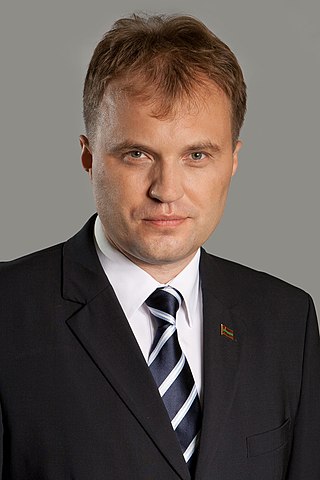
Yevgeny Vasilyevich Shevchuk is a Transnistrian former politician who served as the second President of Transnistria, from 2011 to 2016.
Aleksandr Radchenko was an ethnic Ukrainian politician and human rights activist from Transnistria. A former Soviet military officer, he was the editor of a small opposition newspaper in Tiraspol called Chelovek i ego prava. Most of his articles deal with human rights issues.
Tom Markovich Zenovich was a politician and former presidential candidate from Transnistria, a break-away region of Moldova. Prior to his presidential run in 2001 he was mayor of Bender, Transnistria's second largest city.

The president of Transnistria, officially the president of the Pridnestrovian Moldavian Republic, is the highest elected official of Transnistria. The president of the republic is the country's head of state and is also commander in chief of its armed forces. Per the Constitution of Transnistria, he also represents the country abroad.

The Communist Party of Transnistria was a communist party in Transnistria, led by Vladimir Gavrilchenko. It was described by state media as the more "conservative" communist party in comparison to the Transnistrian Communist Party (PKP).
Nadezhda Andreevna Bondarenko is a Transnistrian politician who has served as the acting chairperson of the Transnistrian Communist Party (PKP) since late 2018. She was formerly a police officer, and was the PKP's candidate for the 2006 presidential election. She is currently the editor-in-chief of the PKP's party newspaper, Pravda Pridnestrovya. She is of Russian and Ukrainian descent.
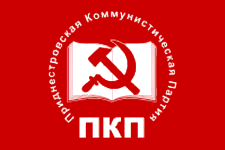
The Transnistrian Communist Party is a communist party in the unrecognized state of Transnistria. The party was led by Oleg Khorzhan until his arrest and imprisonment in 2018.

Presidential elections were held in Transnistria on 11 December 2011. As no candidate received more than 50% of the vote in the first round, a run-off was held on 25 December.
Events in the year 2014 in Transnistria.
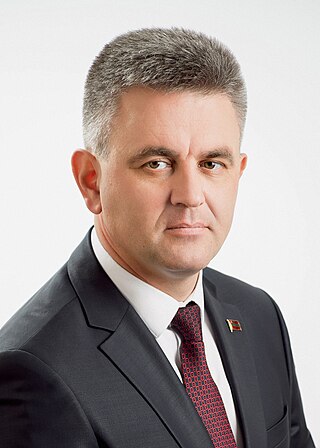
Vadim Nikolayevich Krasnoselsky is a Transnistrian politician who is the 3rd and current President of Transnistria. Previously, he served as a member of the Supreme Council of Transnistria from the 7th district, as 6th Speaker of the Supreme Council (2015–2016) and the 7th Minister of the Interior.
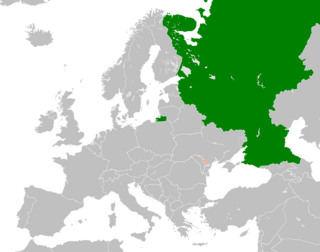
Russia–Transnistria relations are the bilateral relations between the Pridnestrovian Moldavian Republic (Transnistria), an unrecognised breakaway state that is internationally recognised as part of Moldova, and the Russian Federation. Russia does not officially recognise the independence of Transnistria; nevertheless, Russia maintains special relations with Transnistria in the political, military, cultural, and economic spheres.
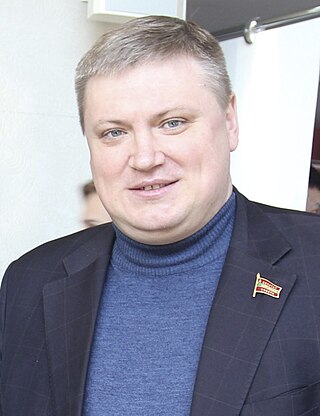
Oleg Olegovich Khorzhan was a Transnistrian politician who served as the chairman of the Transnistrian Communist Party and as a member of Transnistria's Supreme Council.
Presidential elections were held in Transnistria on 12 December 2021 with early voting starting on 6 December 2021. Two candidates were able to register to participate in the elections — incumbent president Vadim Krasnoselsky, and Sergey Pynzar, who came in second in 2016.

Alexandr Viktorovich Korshunov is a Transnistrian Obnovlenie politician. He has been Chairman and Speaker of the Transnistrian Supreme Council since 2019.

Since the outbreak of the Transnistria conflict, there have been efforts and proposals to reincorporate the unrecognized state of Transnistria into Moldova.
Events in the year 2021 in Transnistria.










